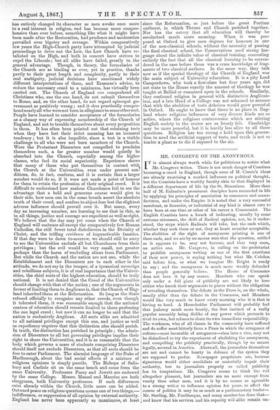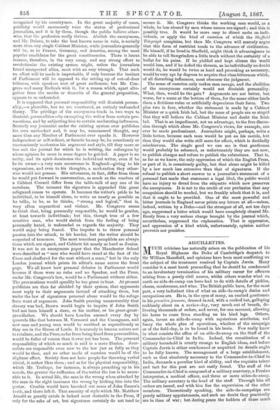MR. CONGREVE ON THE ANONYMOUS.
TT is almost always worth while for politicians to notice what Mr. Congreve writes. There is not much danger of Comtism becoming a creed in England, though some of M. Comte's ideas are already exercising a marked influence on political thought, but the Cointists have a worldly faculty akin to that displayed in - a different department of life by the St. Simonians. More than. half of M. Enfantin'a prominent disciples have succeeded in life by applying his principles of association to commerce and menu- - factures, and under the Empire it is noted that a very successful merchant, or financier, or industrial of any kind is almost sure to- have been at one time or other of his career a Communist. The English Comtists have a knack of indicating, usually by some extreme utterance, the drift of Radical opinion, not, be it under- stood, the steps which Radicals will take, but the ends which, whether they seek them or not, they at heart consider acceptable. The abolition of the right of anonymous printing is one of these ends, and we are by no means sure that the question, settlel as it appears t3 be, may not become, and that very soon, an active one. Mr. Congreve, in calling on the proletariat to prohibit anonymous writing as one of the first exertions of their new power, is saying nothing but what Mr. Cobden. said before him, or what we imagine Mr. Bright is ready to say ; and the anonymous is much more weakly defended than people generally believe. The House of Commons does not love it by any means. Members who can speak only under a full glare of publicity are not likely to love critics who knock their arguments to pieces without the obligation of revealing themselves. The debate in the Press is, on the whole, usually abler than the debate in the Commons, and Members would like very much to know every morning who it is that is hitting so hard. A Householder Parliament will probably feel that jealousy much more keenly, the first instinct of a really popular assembly being dislike of any power which pretends to rival its own, but refuses to share its own immediate responsibility. The workmen, who of all classes in the community have suffered and do suffer most bitterly from a Press in which the arrogance of culture—most incurable of arrogances—rises into a vice, may not be disinclined to try the experiment of abolishing the anonymous, and compelling the publicity practically, though by no means legally, secured in America. Above all, the journalists themselves are not and cannot be hearty in defence of the system they are supposed to prefer. Newspaper proprietors are, because signatures would either annihilate or materially impair their authority, but to journalists properly so called publicity has its temptations. Mr. Congreve seems to think the veil altogether pleasant, but journalists are no more exempt from vanity than other men, and it is by no means so agreeable to a strong writer to influence opinion for years, to affect the course of polities it may be as much as a parliamentary leader— Mr. Sterling, Mr. Fonblanque, and many another has done that— and know that his services and his capacity will alike remain un.
recognized by his countrymen. In the great majority of eases, publicity would enormously raise the status of professional journalists, and it is by them, though the public believe other- wise, that the profession really thrives. Abolish the anonymous, and Mr. Delane, to take the best known name in vain, is socially more than any single Cabinet Minister, while journalists generally will be, as in France, Germany, and America, among the most popular candidates for the great constituencies. There is latent treason, therefore, in the very camp, and any strong effort to revolutionize the existing system might, unless the journalists found unexpected allies, meet with an easy triumph. That such an effort will be made is improbable, if only because the instinct of Parliament will be opposed to the setting up of out-of-door tribunes, with speakers sure of great audiences; but Mr. Con- greve and many Radicals wish it, for a reason which, apart alto- gether from the merits or demerits of the general proposition, appears to us unfounded.
It is supposed that personal responsibility will diminish person- ality,—a plausible, but we are convinced, an entirely unfounded theory. The privilege of the anonymous tends in two ways to diminish personalities—by exempting the writer from certain pro- vocations, and by subjecting him to certain moderating influences. Scarcely any journalist under the existing system ever publishes his own unchecked and, it may be, unmeasured thought, any more than any Member of Parliament ever speaks it. However independent or self-reliant, or fanatic he may be, he consciously or unconsciously moderates his argument and style, till they more or less suit the journal for which he is writing, the colleagues by whose opinion he must in some degree be guided. A paper is an entity, and its spirit dominates the individual writer, even if he be its owner—a very rare occurrence in England—giving to his expressions, and even to his thoughts, a moderation they other- wise would not possess. His utterances, in fact, differ from those he would put forward in conversation, as much as the resolves of a Cabinet Council differ from the table-talk of any one of its members. The moment the signature is appended this great safeguard ceases to operate. It becomes the writer's pride to be individual, to be himself alone, to write as nearly as possible as he talks, to be, as he thinks, "strong and logical," that is, very often unpractical and violent. Mr. Congreve seems to think that, being personally responsible, he would be gentler, at least towards individuals ; but this, though true of a few sensitive men, who would shrink from the feeling of being personally hated, is unfounded as regards the majority. They would enjoy being feared. The impulse is to throw personal passion into the attack, to hit harder, lest the writer should be suspected of tameness. The most truculent pamphlets are always those which are signed, and Cobbett hit nearly as hard as Junius. It was not in an anonymous paper that the Manchester School were described as "men who would have stood at the foot of the Cross and chaffered for the coat without a seam," but in the only London journal which prints its editor's name across the front page. We all know how personal debates in Parliament would become if there were no rules and no Speaker, and the Press, under Mr. Congreve's law, would be a Parliament without either. The provocations would speedily be too great to bear. At present publicists are thus far shielded by their system, that opponents must reply to their arguments instead of attacking them, but under the law of signatures personal abuse would be the refuge from want of argument. John Smith proving =answerably that slavery was bad, Brown would begin to inquire if John Smith had not been himself a slave, or his mother, or his great-great- grandfather. We should have London amused every day by quarrels like that between M. Vermorel and the Cassagi, nes, and new men and young men would be snubbed as superciliously as they are in the House of Lords. It is scarcely in human nature not to retaliate, and the Press, so far from being freed from personalities, would be fuller of venom than it ever yet has been. The personal responsibility of which so much is said is a mere illusion. Jour- nalists are responsible even now to the law just as fully as they would be then, and no other mode of coercion would be of the slightest effect. Society does not hate people for throwing verbal vitriol, it rather likes them ; and as for the physical responsibility, which Mr. Trollope, for instance, is always preaching up in his novels, the greater the ruffianism of the writer the less is he amen- able to it. In actual life, the man in the wrong when attacked by the man in the right increases the wrong by kicking him into the gutter. Crosbie would have knocked out some of John Eames's teeth, and there left it. That amenity of style which Mr. Matthew Arnold so greatly extols is indeed most desirable in the Press, if bnly for the sake of art, but signatures certainly do not tend to secure it. Mr. Congreve thinks the working men would, as a whole, be less abused by men whose names are signed ; and this is possibly true. It would be more easy to direct mobs on indi- viduals, or apply the kind of coercion of which the Sheffield Telegraph complains, but then Mr. Congreve will scarcely argue that this form of restrkint tends to the advance of civilization. He himself, if he lived in Sheffield, might think it advantageous to be able to tell Sawgrinders a little truth without the certainty of a bullet for his pains. If he yielded and kept silence the world would lose, and if he defied the threats, as he individually no doubt would do, he would be twice as hard and provoking as necessary, would be very apt by degrees to acquire that class bitterness which, of all disturbing influences, most obscures the judgment.
The sense of coercion only makes men savage, and the abolition of the anonymous certainly would not diminish personality. What, then, would be the gain ? Arguments are not better, but worse, for a name at the bottom of them, for the name either lends them a fictitious value or artificially depreciates their force. Two plus two is four, whether the statement is made by a Cabinet Minister or a quick Irish lad, but the mass of people are so stupid that they will believe the Cabinet Minister and doubt the Irish lad. That is an impediment, not an advantage, to the free discus- sion through which alone Mr. Congreve's views, for example, can ever be made predominant. Journalists might, perhaps, write a little better, because each man would be put on his mettle, but then they would also write still more for effect, which is decidedly mischievous. The single good we can sea is that gentlemen would probably be ashamed, as unfortunately they are not now, to publish charges and refuse to publish the refutations. That is, as far as we know, the only oppression of which the English Press, or part of it, is consciously guilty, but that abuse might be killed by a law much less extensive than that of signatures. If the refusal to publish a short answer to a journalist's statement, of a personal fact made that statement a legal libel, the public would have no injury to dread from the etiquette which now preserves the anonymous. It is not to the credit of our profession that any compulsion should be needed, but we frankly admit that it is, and that it ought to be provided. One of the most powerful and bitter journals in England never prints any letters at all—unless, indeed, written by a Duke—and the strongest of all, not ten days ago, suppressed a letter which would have completely cleared Mr. Beesly from a very serious charge brought by the journal which, nevertheless, suppressed the explanation. That is oppression, and oppression of a kind which, unfortunately, opinion neither prevents nor punishes.































 Previous page
Previous page